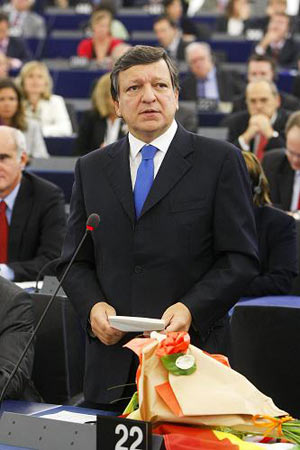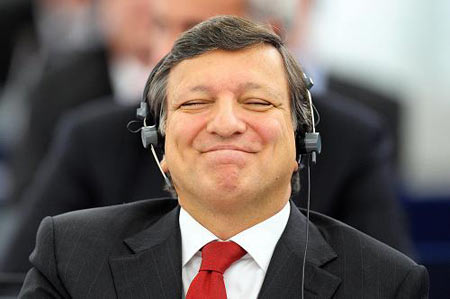European Commission President Jose Manuel Barroso on Wednesday won support of the European Parliament for his second five-year term.
 |
|
European Commission President Jose Manuel Barroso addresses members of the European Parliament after his re-election for a new term as president of the Commission at the European Parliament in Strasbourg September 16, 2009. [Xinhua] |
The 736-seat assembly voted 382-219 with 117 abstentions to elect Barroso as president of the new commission, giving him a much-needed absolute majority.
The election of the commission president is currently governed by rules of the Nice Treaty, which requires a simple majority -- 301 votes in this case. But an absolute majority -- at least 369 votes -- as required by the stalled Lisbon Treaty, would give Barroso a strong mandate for the next five years.
Barroso explained after the vote that the stronger-than-expected support meant that members of the European Parliament from the left wing refused to follow orders of their groups and voted for him.
The center-right European People's Party (Christian Democrats) -- the largest political group in the European Parliament, the Liberals and the Conservative group had voiced support for Barroso. But the second largest political force, the 184-member Socialist group, and the 55-member Greens group were against his re-election.
In a debate on Tuesday, Socialist leader Martin Schulz told Barroso: "Let me say one thing for sure: you do not have the support of my group."
Greens chairman Daniel Cohn-Bendit said clearly that his group would vote against Barroso.
 |
|
European Commission President Jose Manuel Barroso attends a debate on his candidacy for a new term as Commission President in Strasbourg September 15, 2009. [Xinhua] |
Since Wednesday's vote was by secret ballot, there is no way to determine how the members of the two groups voted.
Barroso was the only candidate for the job as the Socialists failed to nominate a candidate of their own.
After the vote, Barroso thanked the assembly for the endorsement and pledged to work with all political groups in the European Parliament which have signed up to his political program for the next five years.
"As president of the commission, my party is Europe," Barroso told the assembly.
Barroso needs to be formally appointed by the 27 heads of state and government of the EU members.
Wednesday's vote paves the way for Barroso to come up with a list of 26 commissioners, which needs to be approved by the European Parliament as a whole.
Barroso indicated that he would wait for the outcome of the Oct. 2 Irish referendum on the Lisbon Treaty before the new commission is nominated.
"I can't make a start until we have clarity on that (treaty)," he told reporters.
He said he personally hoped the Lisbon Treaty would apply to the composition of the new commission.
Under the Lisbon Treaty, a new post of high representative for foreign affairs will be created. The high representative will concurrently be a vice president of the commission, merging the duties of the current foreign and security policy chief Javier Solana and EU External Relations Commissioner Benita Ferrero-Waldner.
The Lisbon Treaty has also provisions for the number of commissioners.
Barroso, 53, served as Portuguese prime minister before he became European Commission president in November 2004.
(Xinhua News Agency September 17, 2009)